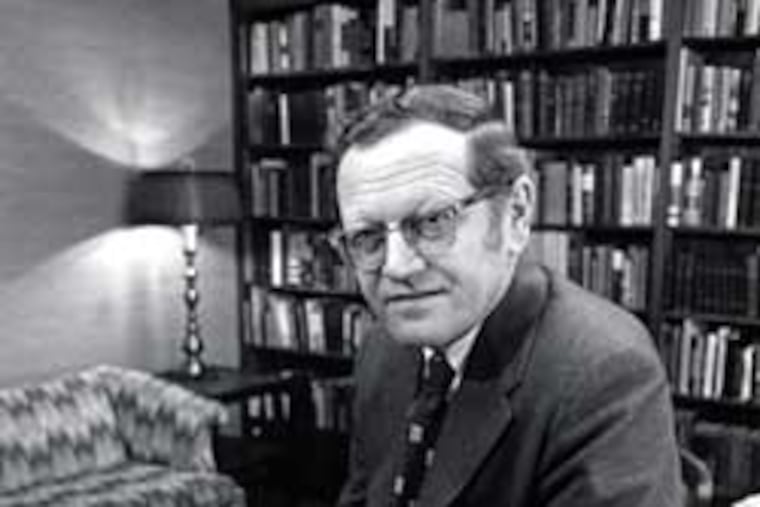Ex-president of Temple led school in tough times
Marvin Wachman, 90, a former president of Temple University who led the school through a turbulent financial time in the 1970s, died yesterday at his Chestnut Hill home.

Marvin Wachman, 90, a former president of Temple University who led the school through a turbulent financial time in the 1970s, died yesterday at his Chestnut Hill home.
His wife of more than 65 years, Adeline, said he had battled heart problems in recent years and had been hospitalized twice in the last two months. She recalled him as "so interested in people, interested in helping others." And, she added, "he loved his tennis."
Mr. Wachman's skill at the game won him a scholarship to Northwestern University, where he earned bachelor's and master's degrees in history. His court connections led to an invitation to help coach the team at the University of Illinois, where he earned his doctorate and met his future wife.
He played matches against Wimbledon champion Bobby Riggs, 1930s tennis star Alice Marble, and film star Errol Flynn, according to Temple.
As Temple president from 1973 until 1982, Mr. Wachman was credited with improving facilities and community relations, running what he called "a small city." He increased the percentage of minorities enrolled at the school and worked to better relations with the largely black North Philadelphia community. He retired at what was then the mandatory age of 65, succeeded by Peter J. Liacouras.
Yesterday, friends and relatives described Mr. Wachman as a thinker and writer, someone who managed to remain calm and polite despite controversy.
And the Temple of that era had that.
Mr. Wachman faced a financial crisis in 1974, saying the university would go bankrupt unless it could manage a $30 million deficit at Temple University Hospital. He successfully persuaded the legislature to bail out the school and increase its annual subsidy, but was not so successful in a different financial struggle five years later.
In 1979, Mr. Wachman tried to fire 16 tenured professors because of declining enrollment. He withdrew the plan after one of his deans resigned to protest the firings.
That same year, Mr. Wachman went to Washington to present Chinese Vice Premier Deng Xiao Ping with an honorary law degree, which incensed some Temple Law School officials.
"He was a remarkable man, very self-effacing, a very human guy," said George Ingram, who as part of the Temple News Bureau helped draft Mr. Wachman's speeches and budget messages.
Despite the challenges at Temple, "I never saw him get rattled. He was always calm," Ingram said.
A Milwaukee native, Mr. Wachman graduated from Northwestern in 1939. Days after defending his doctoral thesis at the University of Illinois - on Milwaukee's Socialist history - he was inducted into the Army. During World War II, he served four years as an infantry sergeant in France and Germany.
In the early 1950s, he was offered a position with the CIA as a "France watcher," keeping tabs on the rise of the French Communist Party. He declined.
He spent 13 years teaching at Colgate University, then two years directing the Salzburg Seminar in Austria, where he and his family lived in Schloss Leopoldskron, the castle featured in the film The Sound of Music.
Mr. Wachman, white and Jewish, was appointed president of historically black Lincoln University in 1961 and led the school through the most contentious years of the civil rights movement. He left that post in 1970.
In 2005, the Temple University Press published his memoir, The Education of a University President.
Mr. Wachman decided against a funeral, feeling that he had lived a long and full life. Arrangements were being made yesterday for a celebration of Mr. Wachman's life, to be held at a later date.
In addition to his wife, Mr. Wachman is survived by daughters Katie and Lynn.